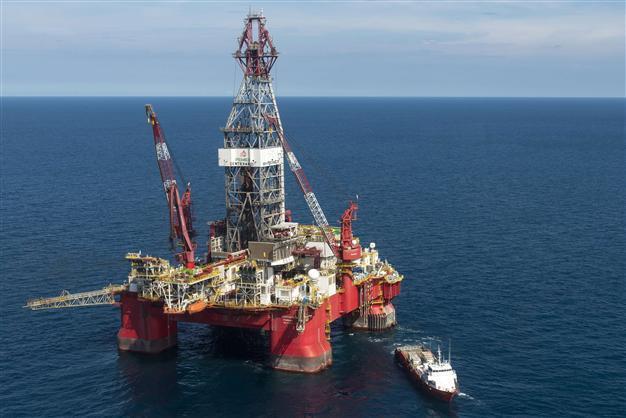Turkish Cypriot negotiator urges suspension of gas drilling
BRUSSELS/NICOSIA

AFP Photo
Greek and Turkish Cypriots should both agree to suspend the search for offshore natural gas until they have reached a settlement to reunify their divided island, the chief Turkish Cypriot negotiator has said, as Turkey’s foreign minister expressed hopes of finding a solution to the issue with the new Greek government.
“We will hopefully look forward to finding an arrangement during which both sides will refrain from continuing activities in the sea, get to the negotiating table and find a way to deal with the hydrocarbons issue,” said Ergün Olgun, the Turkish Cypriot negotiator.
Both sides should agree to suspend exploration to open the way for a resumption of the peace talks, he told Reuters in an interview.
Olgun also accused the Greek Cypriot side of using gas exploration as “a pretext to continue with the perpetuation of the status quo in Cyprus.”
Turks hoping for new momentum with SyrizaMeanwhile, Turkish Cypriot Foreign Minister Özdil Nami has said the Turkish side was hoping for better relations with the Greek side after the Coalition of the Radical Left (Syriza) won the Greek elections on Jan. 25.
Expressing wishes that the elections results will be good for the Greek people, Nami said Greece had been focused on its own internal problems for years, meaning it had failed to help decease tension in Cyprus.
“We hope that Greece will encourage the Greek [Cypriot] leader that left the negotiation table, considering the positive impact that a comprehensive and fair solution to the Cypriot problem will have on Turkish-Greek relations,” the minister told Anadolu Agency on Jan. 28.
The foreign minister said Turkey and Greece had a “long-standing friendship and bilateral interests,” which, according to him, raises the importance of Cyprus peace, particularly for Greece.
“Greece is a country supporting Turkey’s EU membership and we hope this government will carry this support even further,” he said. “It is a known fact that economic relations with Turkey are very important for Greece. The lingering of Cyprus problem prevents the relationship from reaching its full potential.”
Gas is ‘curse’ for Cyprus for nowNatural gas was discovered off Cyprus in 2011. Greek Cypriots have licensed exploration sites to several international energy companies in an area south of the island.
But the island’s hopes of a natural resources bonanza were dealt a blow last week when it emerged that France’s Total was likely to abandon its current search for oil and gas off Cyprus after finding no tangible evidence of reserves.
A Turkish company sent a research vessel into the same area in October 2014, prompting Greek Cypriots to suspend peace talks with Turkish Cypriots on the grounds that the move was provocative.
Greek Cypriots said Turkish Cypriots could share the potential benefits of energy exploration, but only when there is a peace deal. Turkey alleges that Greek Cypriots are exploiting the island’s natural resources for their own gain.
Finding oil or gas could be a blessing or a curse, Olgun said during a visit to Brussels where he was holding talks with European Commission and European Parliament officials.
“Unfortunately Greek Cypriots have managed it in a way that has turned into a curse so far. But we can turn it into a blessing with the understanding that we will benefit from hydrocarbons following a settlement of the Cyprus issue,” he said.
The recent slide in energy prices is not helping the case for exploration off Cyprus, Olgun said.
“Why should we artificially put before a Cyprus settlement an issue which economically no longer makes sense? Petrol companies are withdrawing their interest,” he added.
